Customer Satisfaction in the Hotel Industry
VerifiedAdded on 2020/02/05
|13
|4304
|33
AI Summary
This assignment investigates customer satisfaction within the hotel industry. It explores various research studies examining how customers perceive service quality in hotels, focusing on factors like price discounts, animation programs, and brand reputation. The analysis delves into determinants of customer loyalty and purchasing behavior across different types of hotels (full-service and limited-service). Additionally, it considers the impact of lean thinking principles on European hotel operations.
Contribute Materials
Your contribution can guide someone’s learning journey. Share your
documents today.
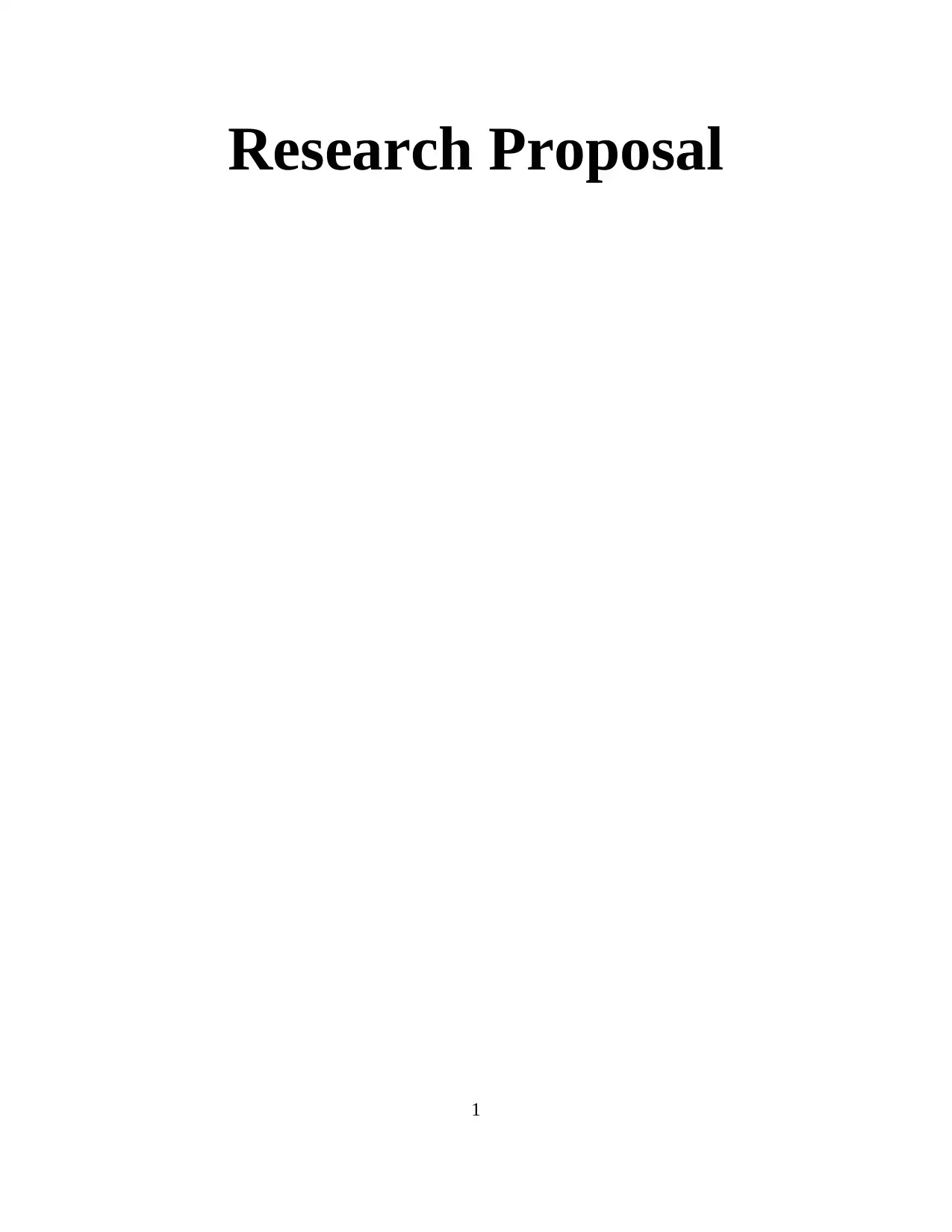
Research Proposal
1
1
Secure Best Marks with AI Grader
Need help grading? Try our AI Grader for instant feedback on your assignments.
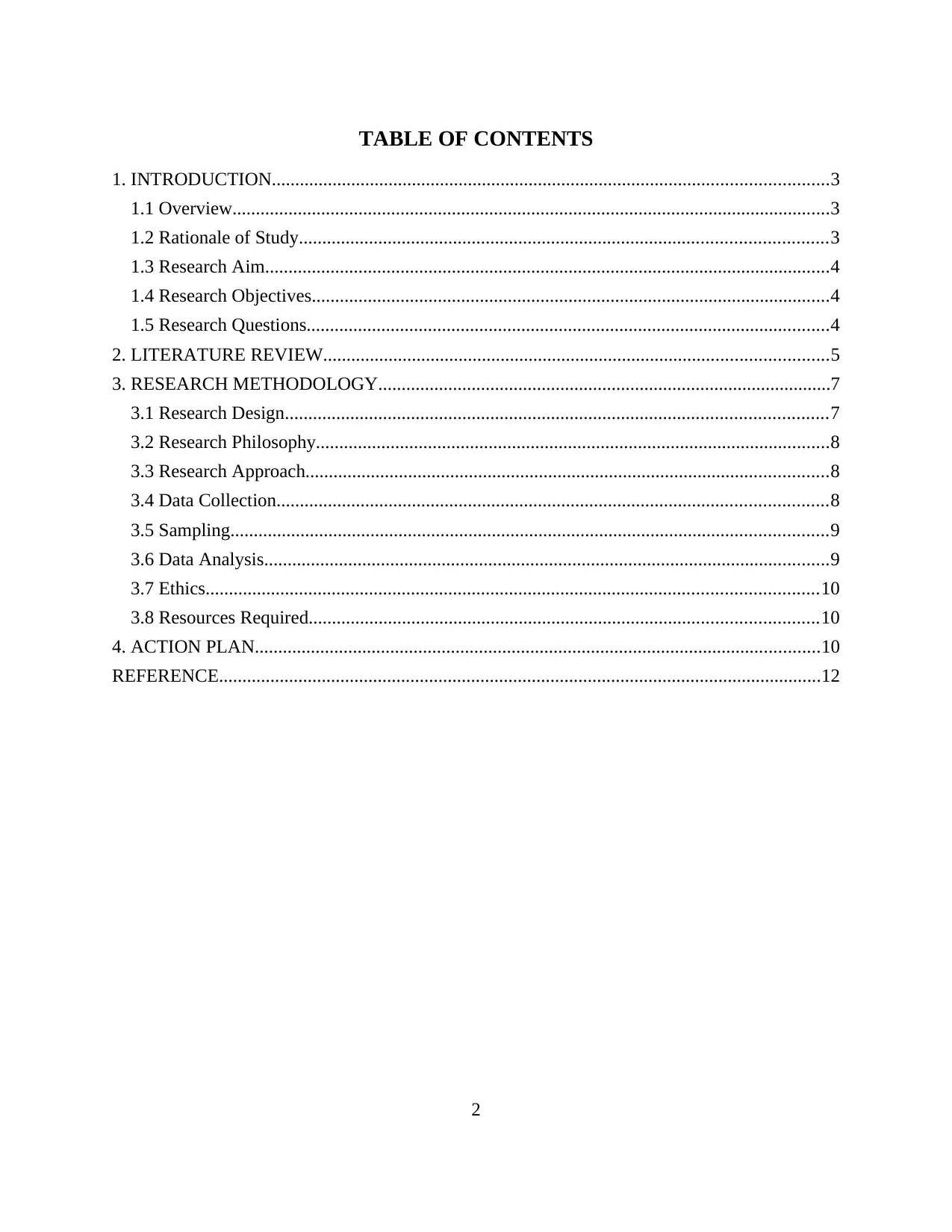
TABLE OF CONTENTS
1. INTRODUCTION.......................................................................................................................3
1.1 Overview................................................................................................................................3
1.2 Rationale of Study.................................................................................................................3
1.3 Research Aim.........................................................................................................................4
1.4 Research Objectives...............................................................................................................4
1.5 Research Questions................................................................................................................4
2. LITERATURE REVIEW............................................................................................................5
3. RESEARCH METHODOLOGY.................................................................................................7
3.1 Research Design....................................................................................................................7
3.2 Research Philosophy..............................................................................................................8
3.3 Research Approach................................................................................................................8
3.4 Data Collection......................................................................................................................8
3.5 Sampling................................................................................................................................9
3.6 Data Analysis.........................................................................................................................9
3.7 Ethics...................................................................................................................................10
3.8 Resources Required.............................................................................................................10
4. ACTION PLAN.........................................................................................................................10
REFERENCE.................................................................................................................................12
2
1. INTRODUCTION.......................................................................................................................3
1.1 Overview................................................................................................................................3
1.2 Rationale of Study.................................................................................................................3
1.3 Research Aim.........................................................................................................................4
1.4 Research Objectives...............................................................................................................4
1.5 Research Questions................................................................................................................4
2. LITERATURE REVIEW............................................................................................................5
3. RESEARCH METHODOLOGY.................................................................................................7
3.1 Research Design....................................................................................................................7
3.2 Research Philosophy..............................................................................................................8
3.3 Research Approach................................................................................................................8
3.4 Data Collection......................................................................................................................8
3.5 Sampling................................................................................................................................9
3.6 Data Analysis.........................................................................................................................9
3.7 Ethics...................................................................................................................................10
3.8 Resources Required.............................................................................................................10
4. ACTION PLAN.........................................................................................................................10
REFERENCE.................................................................................................................................12
2
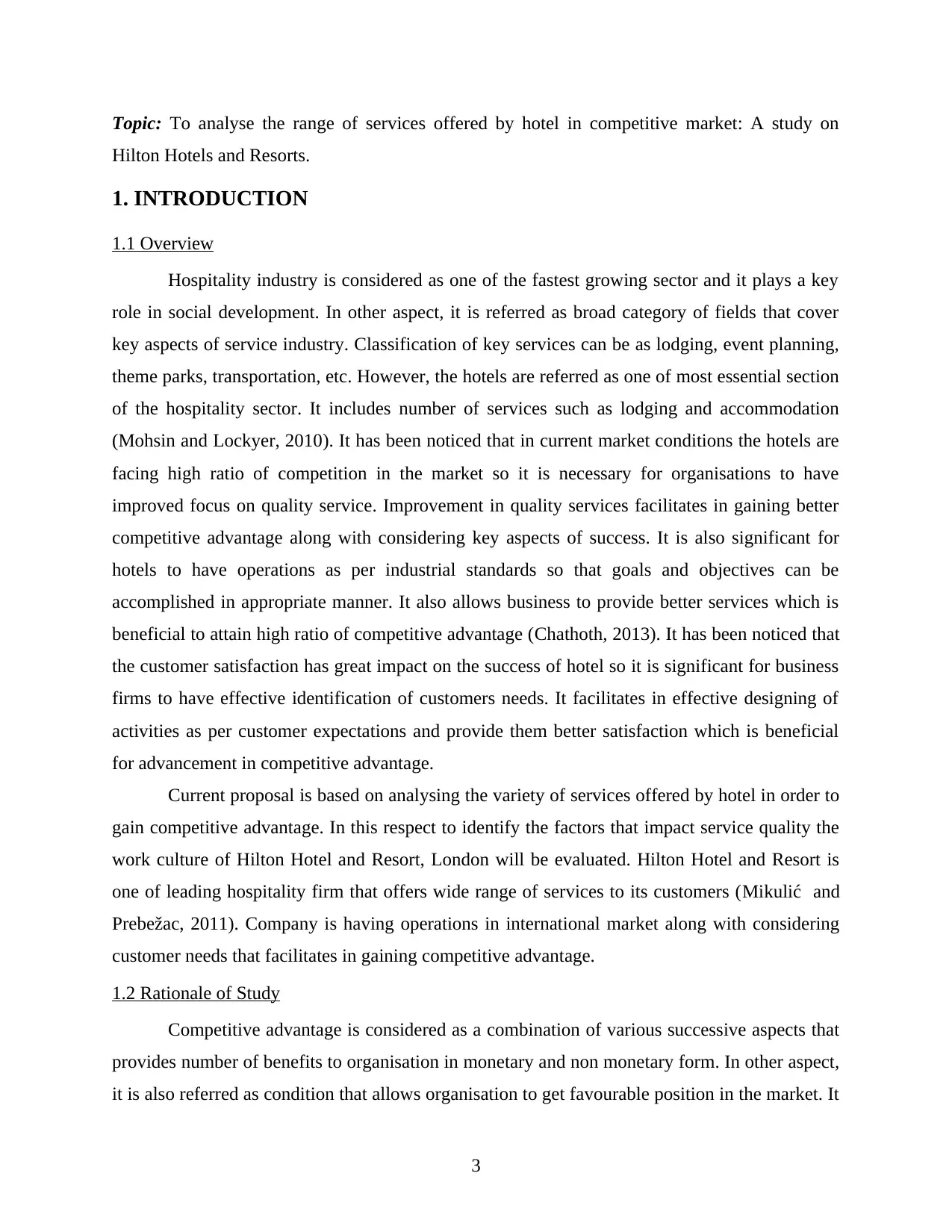
Topic: To analyse the range of services offered by hotel in competitive market: A study on
Hilton Hotels and Resorts.
1. INTRODUCTION
1.1 Overview
Hospitality industry is considered as one of the fastest growing sector and it plays a key
role in social development. In other aspect, it is referred as broad category of fields that cover
key aspects of service industry. Classification of key services can be as lodging, event planning,
theme parks, transportation, etc. However, the hotels are referred as one of most essential section
of the hospitality sector. It includes number of services such as lodging and accommodation
(Mohsin and Lockyer, 2010). It has been noticed that in current market conditions the hotels are
facing high ratio of competition in the market so it is necessary for organisations to have
improved focus on quality service. Improvement in quality services facilitates in gaining better
competitive advantage along with considering key aspects of success. It is also significant for
hotels to have operations as per industrial standards so that goals and objectives can be
accomplished in appropriate manner. It also allows business to provide better services which is
beneficial to attain high ratio of competitive advantage (Chathoth, 2013). It has been noticed that
the customer satisfaction has great impact on the success of hotel so it is significant for business
firms to have effective identification of customers needs. It facilitates in effective designing of
activities as per customer expectations and provide them better satisfaction which is beneficial
for advancement in competitive advantage.
Current proposal is based on analysing the variety of services offered by hotel in order to
gain competitive advantage. In this respect to identify the factors that impact service quality the
work culture of Hilton Hotel and Resort, London will be evaluated. Hilton Hotel and Resort is
one of leading hospitality firm that offers wide range of services to its customers (Mikulić and
Prebežac, 2011). Company is having operations in international market along with considering
customer needs that facilitates in gaining competitive advantage.
1.2 Rationale of Study
Competitive advantage is considered as a combination of various successive aspects that
provides number of benefits to organisation in monetary and non monetary form. In other aspect,
it is also referred as condition that allows organisation to get favourable position in the market. It
3
Hilton Hotels and Resorts.
1. INTRODUCTION
1.1 Overview
Hospitality industry is considered as one of the fastest growing sector and it plays a key
role in social development. In other aspect, it is referred as broad category of fields that cover
key aspects of service industry. Classification of key services can be as lodging, event planning,
theme parks, transportation, etc. However, the hotels are referred as one of most essential section
of the hospitality sector. It includes number of services such as lodging and accommodation
(Mohsin and Lockyer, 2010). It has been noticed that in current market conditions the hotels are
facing high ratio of competition in the market so it is necessary for organisations to have
improved focus on quality service. Improvement in quality services facilitates in gaining better
competitive advantage along with considering key aspects of success. It is also significant for
hotels to have operations as per industrial standards so that goals and objectives can be
accomplished in appropriate manner. It also allows business to provide better services which is
beneficial to attain high ratio of competitive advantage (Chathoth, 2013). It has been noticed that
the customer satisfaction has great impact on the success of hotel so it is significant for business
firms to have effective identification of customers needs. It facilitates in effective designing of
activities as per customer expectations and provide them better satisfaction which is beneficial
for advancement in competitive advantage.
Current proposal is based on analysing the variety of services offered by hotel in order to
gain competitive advantage. In this respect to identify the factors that impact service quality the
work culture of Hilton Hotel and Resort, London will be evaluated. Hilton Hotel and Resort is
one of leading hospitality firm that offers wide range of services to its customers (Mikulić and
Prebežac, 2011). Company is having operations in international market along with considering
customer needs that facilitates in gaining competitive advantage.
1.2 Rationale of Study
Competitive advantage is considered as a combination of various successive aspects that
provides number of benefits to organisation in monetary and non monetary form. In other aspect,
it is also referred as condition that allows organisation to get favourable position in the market. It
3
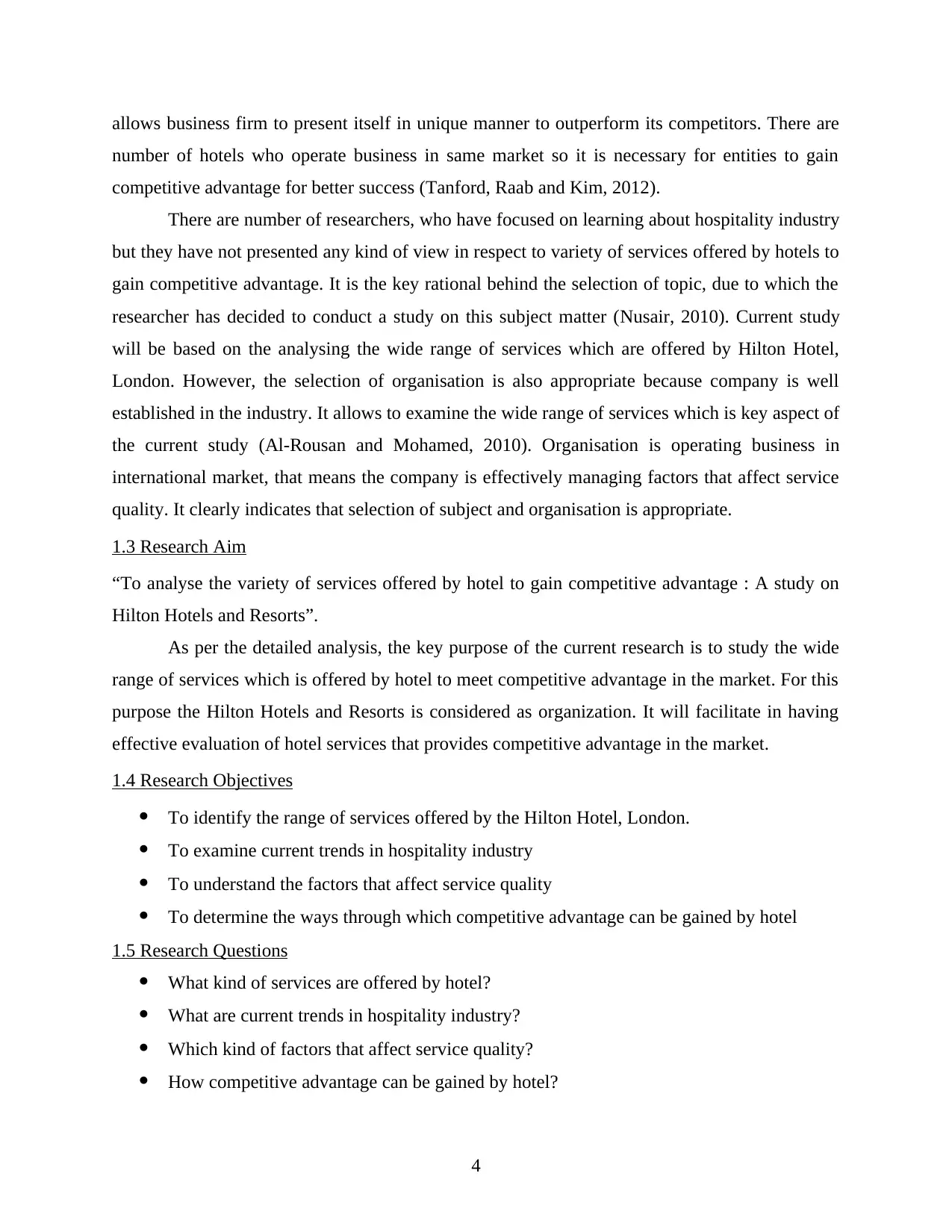
allows business firm to present itself in unique manner to outperform its competitors. There are
number of hotels who operate business in same market so it is necessary for entities to gain
competitive advantage for better success (Tanford, Raab and Kim, 2012).
There are number of researchers, who have focused on learning about hospitality industry
but they have not presented any kind of view in respect to variety of services offered by hotels to
gain competitive advantage. It is the key rational behind the selection of topic, due to which the
researcher has decided to conduct a study on this subject matter (Nusair, 2010). Current study
will be based on the analysing the wide range of services which are offered by Hilton Hotel,
London. However, the selection of organisation is also appropriate because company is well
established in the industry. It allows to examine the wide range of services which is key aspect of
the current study (Al-Rousan and Mohamed, 2010). Organisation is operating business in
international market, that means the company is effectively managing factors that affect service
quality. It clearly indicates that selection of subject and organisation is appropriate.
1.3 Research Aim
“To analyse the variety of services offered by hotel to gain competitive advantage : A study on
Hilton Hotels and Resorts”.
As per the detailed analysis, the key purpose of the current research is to study the wide
range of services which is offered by hotel to meet competitive advantage in the market. For this
purpose the Hilton Hotels and Resorts is considered as organization. It will facilitate in having
effective evaluation of hotel services that provides competitive advantage in the market.
1.4 Research Objectives
To identify the range of services offered by the Hilton Hotel, London.
To examine current trends in hospitality industry
To understand the factors that affect service quality
To determine the ways through which competitive advantage can be gained by hotel
1.5 Research Questions
What kind of services are offered by hotel?
What are current trends in hospitality industry?
Which kind of factors that affect service quality?
How competitive advantage can be gained by hotel?
4
number of hotels who operate business in same market so it is necessary for entities to gain
competitive advantage for better success (Tanford, Raab and Kim, 2012).
There are number of researchers, who have focused on learning about hospitality industry
but they have not presented any kind of view in respect to variety of services offered by hotels to
gain competitive advantage. It is the key rational behind the selection of topic, due to which the
researcher has decided to conduct a study on this subject matter (Nusair, 2010). Current study
will be based on the analysing the wide range of services which are offered by Hilton Hotel,
London. However, the selection of organisation is also appropriate because company is well
established in the industry. It allows to examine the wide range of services which is key aspect of
the current study (Al-Rousan and Mohamed, 2010). Organisation is operating business in
international market, that means the company is effectively managing factors that affect service
quality. It clearly indicates that selection of subject and organisation is appropriate.
1.3 Research Aim
“To analyse the variety of services offered by hotel to gain competitive advantage : A study on
Hilton Hotels and Resorts”.
As per the detailed analysis, the key purpose of the current research is to study the wide
range of services which is offered by hotel to meet competitive advantage in the market. For this
purpose the Hilton Hotels and Resorts is considered as organization. It will facilitate in having
effective evaluation of hotel services that provides competitive advantage in the market.
1.4 Research Objectives
To identify the range of services offered by the Hilton Hotel, London.
To examine current trends in hospitality industry
To understand the factors that affect service quality
To determine the ways through which competitive advantage can be gained by hotel
1.5 Research Questions
What kind of services are offered by hotel?
What are current trends in hospitality industry?
Which kind of factors that affect service quality?
How competitive advantage can be gained by hotel?
4
Secure Best Marks with AI Grader
Need help grading? Try our AI Grader for instant feedback on your assignments.
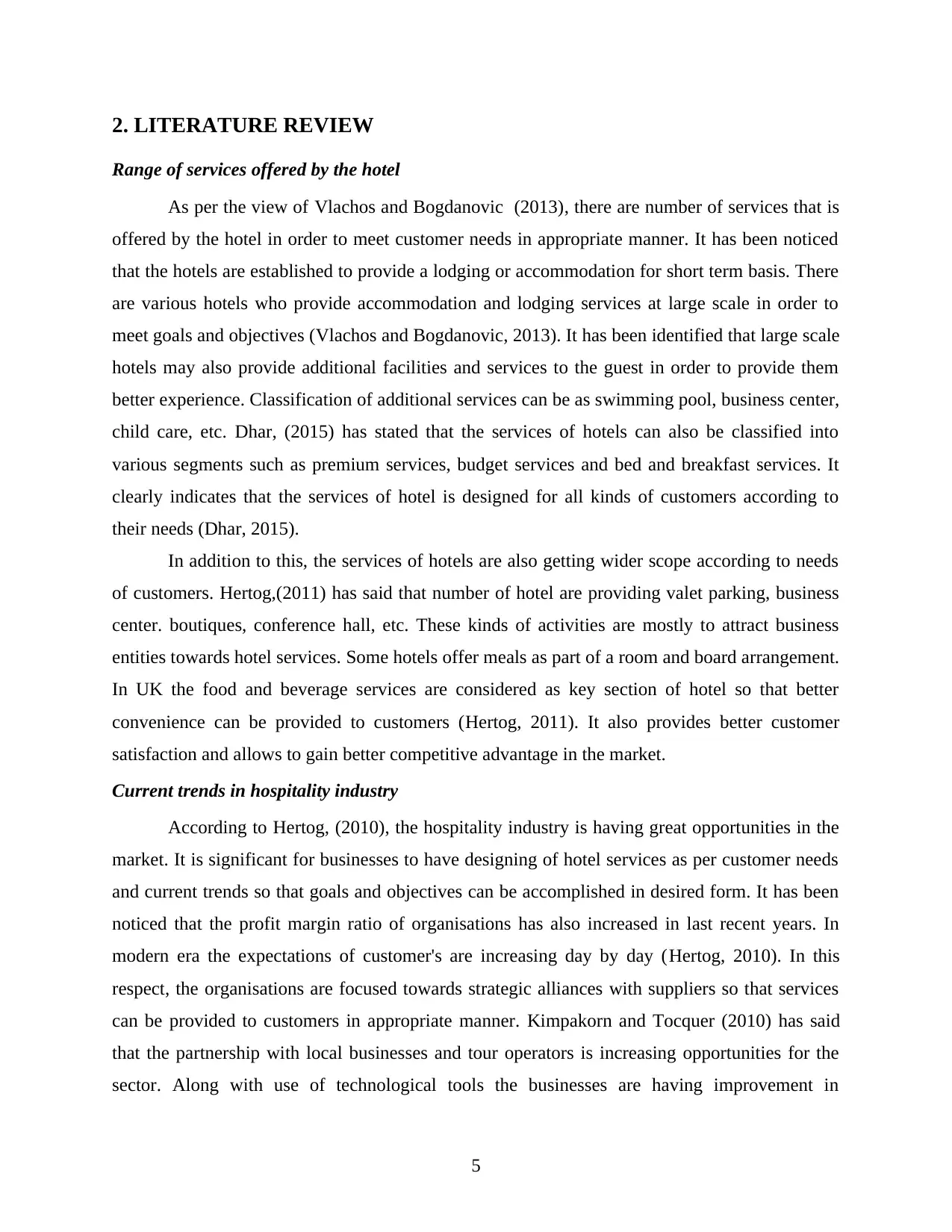
2. LITERATURE REVIEW
Range of services offered by the hotel
As per the view of Vlachos and Bogdanovic (2013), there are number of services that is
offered by the hotel in order to meet customer needs in appropriate manner. It has been noticed
that the hotels are established to provide a lodging or accommodation for short term basis. There
are various hotels who provide accommodation and lodging services at large scale in order to
meet goals and objectives (Vlachos and Bogdanovic, 2013). It has been identified that large scale
hotels may also provide additional facilities and services to the guest in order to provide them
better experience. Classification of additional services can be as swimming pool, business center,
child care, etc. Dhar, (2015) has stated that the services of hotels can also be classified into
various segments such as premium services, budget services and bed and breakfast services. It
clearly indicates that the services of hotel is designed for all kinds of customers according to
their needs (Dhar, 2015).
In addition to this, the services of hotels are also getting wider scope according to needs
of customers. Hertog,(2011) has said that number of hotel are providing valet parking, business
center. boutiques, conference hall, etc. These kinds of activities are mostly to attract business
entities towards hotel services. Some hotels offer meals as part of a room and board arrangement.
In UK the food and beverage services are considered as key section of hotel so that better
convenience can be provided to customers (Hertog, 2011). It also provides better customer
satisfaction and allows to gain better competitive advantage in the market.
Current trends in hospitality industry
According to Hertog, (2010), the hospitality industry is having great opportunities in the
market. It is significant for businesses to have designing of hotel services as per customer needs
and current trends so that goals and objectives can be accomplished in desired form. It has been
noticed that the profit margin ratio of organisations has also increased in last recent years. In
modern era the expectations of customer's are increasing day by day (Hertog, 2010). In this
respect, the organisations are focused towards strategic alliances with suppliers so that services
can be provided to customers in appropriate manner. Kimpakorn and Tocquer (2010) has said
that the partnership with local businesses and tour operators is increasing opportunities for the
sector. Along with use of technological tools the businesses are having improvement in
5
Range of services offered by the hotel
As per the view of Vlachos and Bogdanovic (2013), there are number of services that is
offered by the hotel in order to meet customer needs in appropriate manner. It has been noticed
that the hotels are established to provide a lodging or accommodation for short term basis. There
are various hotels who provide accommodation and lodging services at large scale in order to
meet goals and objectives (Vlachos and Bogdanovic, 2013). It has been identified that large scale
hotels may also provide additional facilities and services to the guest in order to provide them
better experience. Classification of additional services can be as swimming pool, business center,
child care, etc. Dhar, (2015) has stated that the services of hotels can also be classified into
various segments such as premium services, budget services and bed and breakfast services. It
clearly indicates that the services of hotel is designed for all kinds of customers according to
their needs (Dhar, 2015).
In addition to this, the services of hotels are also getting wider scope according to needs
of customers. Hertog,(2011) has said that number of hotel are providing valet parking, business
center. boutiques, conference hall, etc. These kinds of activities are mostly to attract business
entities towards hotel services. Some hotels offer meals as part of a room and board arrangement.
In UK the food and beverage services are considered as key section of hotel so that better
convenience can be provided to customers (Hertog, 2011). It also provides better customer
satisfaction and allows to gain better competitive advantage in the market.
Current trends in hospitality industry
According to Hertog, (2010), the hospitality industry is having great opportunities in the
market. It is significant for businesses to have designing of hotel services as per customer needs
and current trends so that goals and objectives can be accomplished in desired form. It has been
noticed that the profit margin ratio of organisations has also increased in last recent years. In
modern era the expectations of customer's are increasing day by day (Hertog, 2010). In this
respect, the organisations are focused towards strategic alliances with suppliers so that services
can be provided to customers in appropriate manner. Kimpakorn and Tocquer (2010) has said
that the partnership with local businesses and tour operators is increasing opportunities for the
sector. Along with use of technological tools the businesses are having improvement in
5
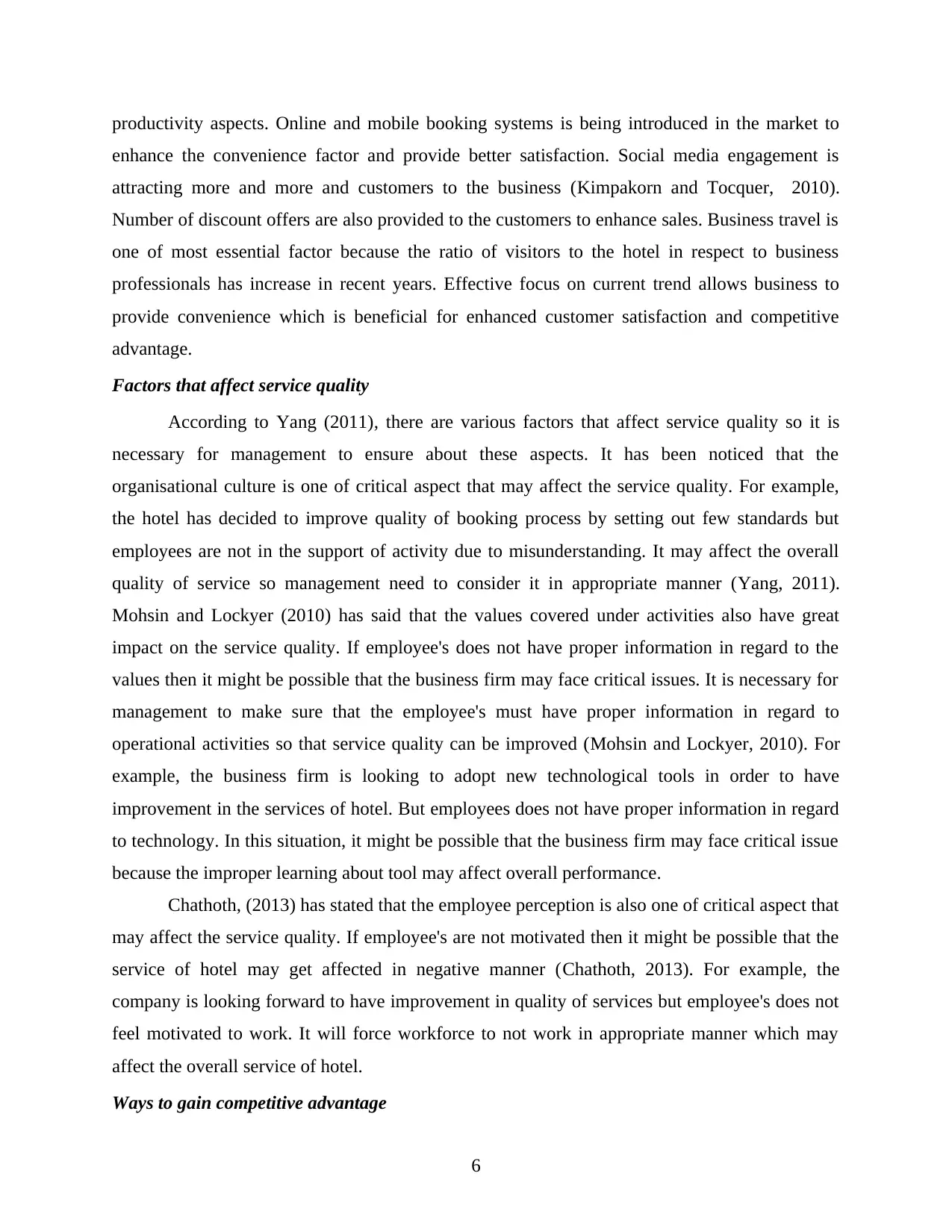
productivity aspects. Online and mobile booking systems is being introduced in the market to
enhance the convenience factor and provide better satisfaction. Social media engagement is
attracting more and more and customers to the business (Kimpakorn and Tocquer, 2010).
Number of discount offers are also provided to the customers to enhance sales. Business travel is
one of most essential factor because the ratio of visitors to the hotel in respect to business
professionals has increase in recent years. Effective focus on current trend allows business to
provide convenience which is beneficial for enhanced customer satisfaction and competitive
advantage.
Factors that affect service quality
According to Yang (2011), there are various factors that affect service quality so it is
necessary for management to ensure about these aspects. It has been noticed that the
organisational culture is one of critical aspect that may affect the service quality. For example,
the hotel has decided to improve quality of booking process by setting out few standards but
employees are not in the support of activity due to misunderstanding. It may affect the overall
quality of service so management need to consider it in appropriate manner (Yang, 2011).
Mohsin and Lockyer (2010) has said that the values covered under activities also have great
impact on the service quality. If employee's does not have proper information in regard to the
values then it might be possible that the business firm may face critical issues. It is necessary for
management to make sure that the employee's must have proper information in regard to
operational activities so that service quality can be improved (Mohsin and Lockyer, 2010). For
example, the business firm is looking to adopt new technological tools in order to have
improvement in the services of hotel. But employees does not have proper information in regard
to technology. In this situation, it might be possible that the business firm may face critical issue
because the improper learning about tool may affect overall performance.
Chathoth, (2013) has stated that the employee perception is also one of critical aspect that
may affect the service quality. If employee's are not motivated then it might be possible that the
service of hotel may get affected in negative manner (Chathoth, 2013). For example, the
company is looking forward to have improvement in quality of services but employee's does not
feel motivated to work. It will force workforce to not work in appropriate manner which may
affect the overall service of hotel.
Ways to gain competitive advantage
6
enhance the convenience factor and provide better satisfaction. Social media engagement is
attracting more and more and customers to the business (Kimpakorn and Tocquer, 2010).
Number of discount offers are also provided to the customers to enhance sales. Business travel is
one of most essential factor because the ratio of visitors to the hotel in respect to business
professionals has increase in recent years. Effective focus on current trend allows business to
provide convenience which is beneficial for enhanced customer satisfaction and competitive
advantage.
Factors that affect service quality
According to Yang (2011), there are various factors that affect service quality so it is
necessary for management to ensure about these aspects. It has been noticed that the
organisational culture is one of critical aspect that may affect the service quality. For example,
the hotel has decided to improve quality of booking process by setting out few standards but
employees are not in the support of activity due to misunderstanding. It may affect the overall
quality of service so management need to consider it in appropriate manner (Yang, 2011).
Mohsin and Lockyer (2010) has said that the values covered under activities also have great
impact on the service quality. If employee's does not have proper information in regard to the
values then it might be possible that the business firm may face critical issues. It is necessary for
management to make sure that the employee's must have proper information in regard to
operational activities so that service quality can be improved (Mohsin and Lockyer, 2010). For
example, the business firm is looking to adopt new technological tools in order to have
improvement in the services of hotel. But employees does not have proper information in regard
to technology. In this situation, it might be possible that the business firm may face critical issue
because the improper learning about tool may affect overall performance.
Chathoth, (2013) has stated that the employee perception is also one of critical aspect that
may affect the service quality. If employee's are not motivated then it might be possible that the
service of hotel may get affected in negative manner (Chathoth, 2013). For example, the
company is looking forward to have improvement in quality of services but employee's does not
feel motivated to work. It will force workforce to not work in appropriate manner which may
affect the overall service of hotel.
Ways to gain competitive advantage
6
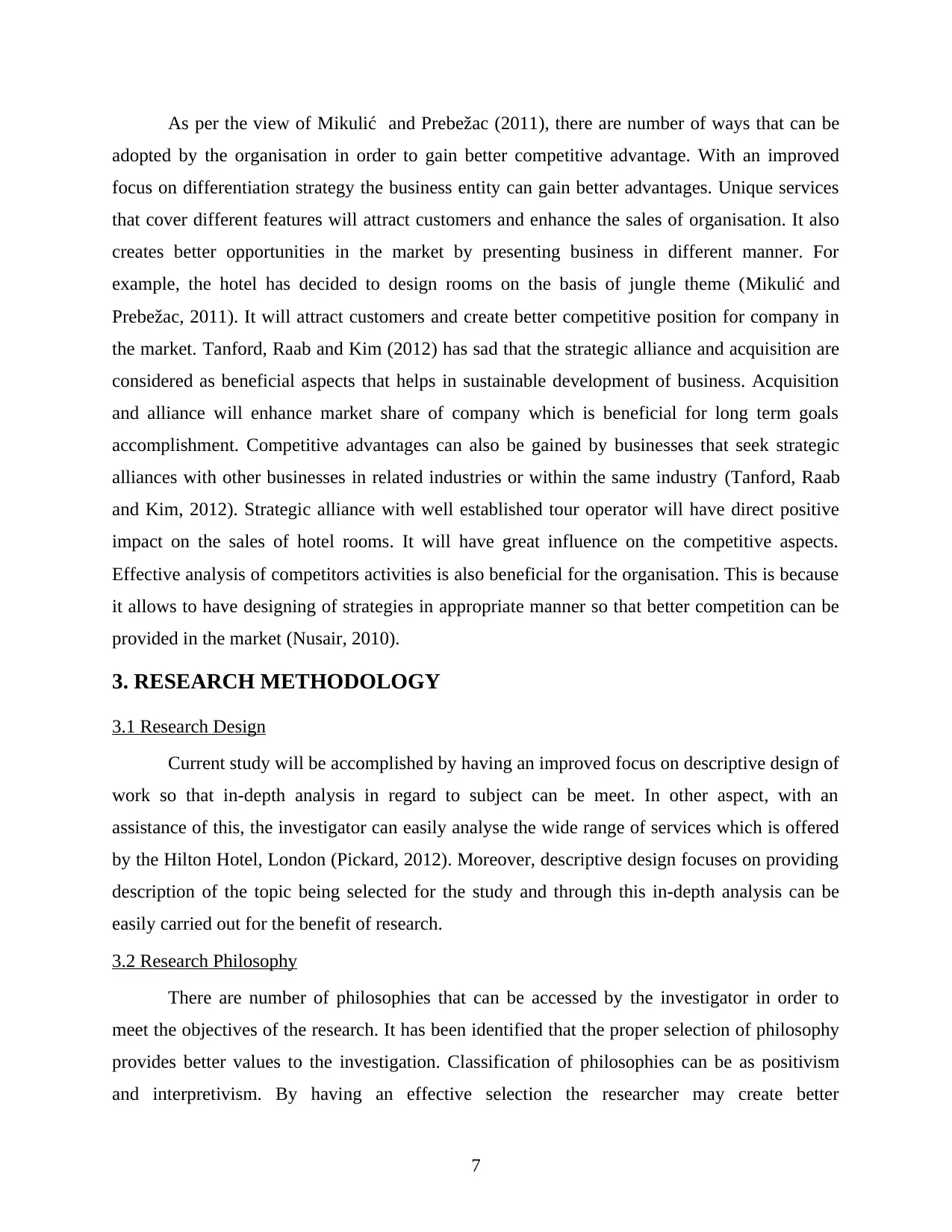
As per the view of Mikulić and Prebežac (2011), there are number of ways that can be
adopted by the organisation in order to gain better competitive advantage. With an improved
focus on differentiation strategy the business entity can gain better advantages. Unique services
that cover different features will attract customers and enhance the sales of organisation. It also
creates better opportunities in the market by presenting business in different manner. For
example, the hotel has decided to design rooms on the basis of jungle theme (Mikulić and
Prebežac, 2011). It will attract customers and create better competitive position for company in
the market. Tanford, Raab and Kim (2012) has sad that the strategic alliance and acquisition are
considered as beneficial aspects that helps in sustainable development of business. Acquisition
and alliance will enhance market share of company which is beneficial for long term goals
accomplishment. Competitive advantages can also be gained by businesses that seek strategic
alliances with other businesses in related industries or within the same industry (Tanford, Raab
and Kim, 2012). Strategic alliance with well established tour operator will have direct positive
impact on the sales of hotel rooms. It will have great influence on the competitive aspects.
Effective analysis of competitors activities is also beneficial for the organisation. This is because
it allows to have designing of strategies in appropriate manner so that better competition can be
provided in the market (Nusair, 2010).
3. RESEARCH METHODOLOGY
3.1 Research Design
Current study will be accomplished by having an improved focus on descriptive design of
work so that in-depth analysis in regard to subject can be meet. In other aspect, with an
assistance of this, the investigator can easily analyse the wide range of services which is offered
by the Hilton Hotel, London (Pickard, 2012). Moreover, descriptive design focuses on providing
description of the topic being selected for the study and through this in-depth analysis can be
easily carried out for the benefit of research.
3.2 Research Philosophy
There are number of philosophies that can be accessed by the investigator in order to
meet the objectives of the research. It has been identified that the proper selection of philosophy
provides better values to the investigation. Classification of philosophies can be as positivism
and interpretivism. By having an effective selection the researcher may create better
7
adopted by the organisation in order to gain better competitive advantage. With an improved
focus on differentiation strategy the business entity can gain better advantages. Unique services
that cover different features will attract customers and enhance the sales of organisation. It also
creates better opportunities in the market by presenting business in different manner. For
example, the hotel has decided to design rooms on the basis of jungle theme (Mikulić and
Prebežac, 2011). It will attract customers and create better competitive position for company in
the market. Tanford, Raab and Kim (2012) has sad that the strategic alliance and acquisition are
considered as beneficial aspects that helps in sustainable development of business. Acquisition
and alliance will enhance market share of company which is beneficial for long term goals
accomplishment. Competitive advantages can also be gained by businesses that seek strategic
alliances with other businesses in related industries or within the same industry (Tanford, Raab
and Kim, 2012). Strategic alliance with well established tour operator will have direct positive
impact on the sales of hotel rooms. It will have great influence on the competitive aspects.
Effective analysis of competitors activities is also beneficial for the organisation. This is because
it allows to have designing of strategies in appropriate manner so that better competition can be
provided in the market (Nusair, 2010).
3. RESEARCH METHODOLOGY
3.1 Research Design
Current study will be accomplished by having an improved focus on descriptive design of
work so that in-depth analysis in regard to subject can be meet. In other aspect, with an
assistance of this, the investigator can easily analyse the wide range of services which is offered
by the Hilton Hotel, London (Pickard, 2012). Moreover, descriptive design focuses on providing
description of the topic being selected for the study and through this in-depth analysis can be
easily carried out for the benefit of research.
3.2 Research Philosophy
There are number of philosophies that can be accessed by the investigator in order to
meet the objectives of the research. It has been identified that the proper selection of philosophy
provides better values to the investigation. Classification of philosophies can be as positivism
and interpretivism. By having an effective selection the researcher may create better
7
Paraphrase This Document
Need a fresh take? Get an instant paraphrase of this document with our AI Paraphraser
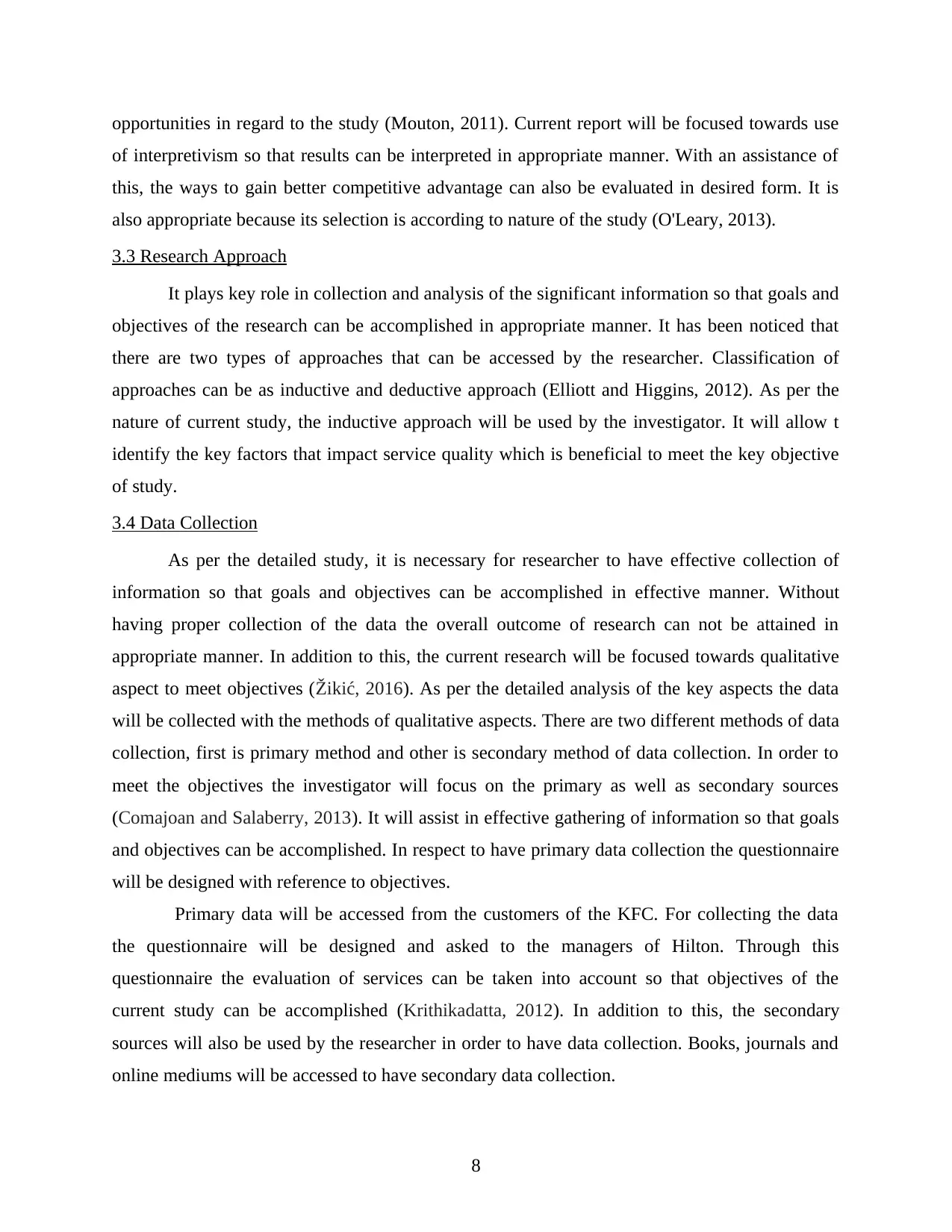
opportunities in regard to the study (Mouton, 2011). Current report will be focused towards use
of interpretivism so that results can be interpreted in appropriate manner. With an assistance of
this, the ways to gain better competitive advantage can also be evaluated in desired form. It is
also appropriate because its selection is according to nature of the study (O'Leary, 2013).
3.3 Research Approach
It plays key role in collection and analysis of the significant information so that goals and
objectives of the research can be accomplished in appropriate manner. It has been noticed that
there are two types of approaches that can be accessed by the researcher. Classification of
approaches can be as inductive and deductive approach (Elliott and Higgins, 2012). As per the
nature of current study, the inductive approach will be used by the investigator. It will allow t
identify the key factors that impact service quality which is beneficial to meet the key objective
of study.
3.4 Data Collection
As per the detailed study, it is necessary for researcher to have effective collection of
information so that goals and objectives can be accomplished in effective manner. Without
having proper collection of the data the overall outcome of research can not be attained in
appropriate manner. In addition to this, the current research will be focused towards qualitative
aspect to meet objectives (Žikić, 2016). As per the detailed analysis of the key aspects the data
will be collected with the methods of qualitative aspects. There are two different methods of data
collection, first is primary method and other is secondary method of data collection. In order to
meet the objectives the investigator will focus on the primary as well as secondary sources
(Comajoan and Salaberry, 2013). It will assist in effective gathering of information so that goals
and objectives can be accomplished. In respect to have primary data collection the questionnaire
will be designed with reference to objectives.
Primary data will be accessed from the customers of the KFC. For collecting the data
the questionnaire will be designed and asked to the managers of Hilton. Through this
questionnaire the evaluation of services can be taken into account so that objectives of the
current study can be accomplished (Krithikadatta, 2012). In addition to this, the secondary
sources will also be used by the researcher in order to have data collection. Books, journals and
online mediums will be accessed to have secondary data collection.
8
of interpretivism so that results can be interpreted in appropriate manner. With an assistance of
this, the ways to gain better competitive advantage can also be evaluated in desired form. It is
also appropriate because its selection is according to nature of the study (O'Leary, 2013).
3.3 Research Approach
It plays key role in collection and analysis of the significant information so that goals and
objectives of the research can be accomplished in appropriate manner. It has been noticed that
there are two types of approaches that can be accessed by the researcher. Classification of
approaches can be as inductive and deductive approach (Elliott and Higgins, 2012). As per the
nature of current study, the inductive approach will be used by the investigator. It will allow t
identify the key factors that impact service quality which is beneficial to meet the key objective
of study.
3.4 Data Collection
As per the detailed study, it is necessary for researcher to have effective collection of
information so that goals and objectives can be accomplished in effective manner. Without
having proper collection of the data the overall outcome of research can not be attained in
appropriate manner. In addition to this, the current research will be focused towards qualitative
aspect to meet objectives (Žikić, 2016). As per the detailed analysis of the key aspects the data
will be collected with the methods of qualitative aspects. There are two different methods of data
collection, first is primary method and other is secondary method of data collection. In order to
meet the objectives the investigator will focus on the primary as well as secondary sources
(Comajoan and Salaberry, 2013). It will assist in effective gathering of information so that goals
and objectives can be accomplished. In respect to have primary data collection the questionnaire
will be designed with reference to objectives.
Primary data will be accessed from the customers of the KFC. For collecting the data
the questionnaire will be designed and asked to the managers of Hilton. Through this
questionnaire the evaluation of services can be taken into account so that objectives of the
current study can be accomplished (Krithikadatta, 2012). In addition to this, the secondary
sources will also be used by the researcher in order to have data collection. Books, journals and
online mediums will be accessed to have secondary data collection.
8
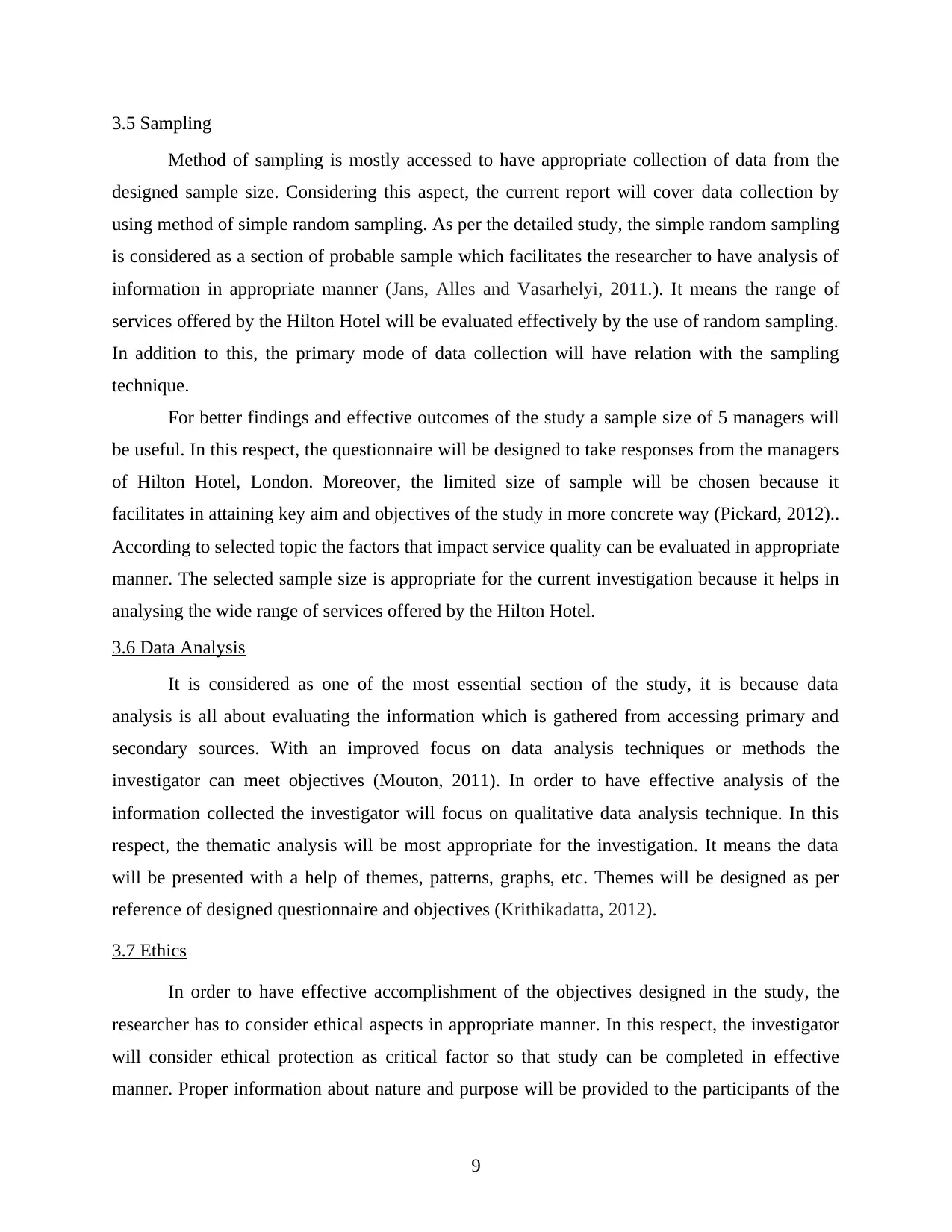
3.5 Sampling
Method of sampling is mostly accessed to have appropriate collection of data from the
designed sample size. Considering this aspect, the current report will cover data collection by
using method of simple random sampling. As per the detailed study, the simple random sampling
is considered as a section of probable sample which facilitates the researcher to have analysis of
information in appropriate manner (Jans, Alles and Vasarhelyi, 2011.). It means the range of
services offered by the Hilton Hotel will be evaluated effectively by the use of random sampling.
In addition to this, the primary mode of data collection will have relation with the sampling
technique.
For better findings and effective outcomes of the study a sample size of 5 managers will
be useful. In this respect, the questionnaire will be designed to take responses from the managers
of Hilton Hotel, London. Moreover, the limited size of sample will be chosen because it
facilitates in attaining key aim and objectives of the study in more concrete way (Pickard, 2012)..
According to selected topic the factors that impact service quality can be evaluated in appropriate
manner. The selected sample size is appropriate for the current investigation because it helps in
analysing the wide range of services offered by the Hilton Hotel.
3.6 Data Analysis
It is considered as one of the most essential section of the study, it is because data
analysis is all about evaluating the information which is gathered from accessing primary and
secondary sources. With an improved focus on data analysis techniques or methods the
investigator can meet objectives (Mouton, 2011). In order to have effective analysis of the
information collected the investigator will focus on qualitative data analysis technique. In this
respect, the thematic analysis will be most appropriate for the investigation. It means the data
will be presented with a help of themes, patterns, graphs, etc. Themes will be designed as per
reference of designed questionnaire and objectives (Krithikadatta, 2012).
3.7 Ethics
In order to have effective accomplishment of the objectives designed in the study, the
researcher has to consider ethical aspects in appropriate manner. In this respect, the investigator
will consider ethical protection as critical factor so that study can be completed in effective
manner. Proper information about nature and purpose will be provided to the participants of the
9
Method of sampling is mostly accessed to have appropriate collection of data from the
designed sample size. Considering this aspect, the current report will cover data collection by
using method of simple random sampling. As per the detailed study, the simple random sampling
is considered as a section of probable sample which facilitates the researcher to have analysis of
information in appropriate manner (Jans, Alles and Vasarhelyi, 2011.). It means the range of
services offered by the Hilton Hotel will be evaluated effectively by the use of random sampling.
In addition to this, the primary mode of data collection will have relation with the sampling
technique.
For better findings and effective outcomes of the study a sample size of 5 managers will
be useful. In this respect, the questionnaire will be designed to take responses from the managers
of Hilton Hotel, London. Moreover, the limited size of sample will be chosen because it
facilitates in attaining key aim and objectives of the study in more concrete way (Pickard, 2012)..
According to selected topic the factors that impact service quality can be evaluated in appropriate
manner. The selected sample size is appropriate for the current investigation because it helps in
analysing the wide range of services offered by the Hilton Hotel.
3.6 Data Analysis
It is considered as one of the most essential section of the study, it is because data
analysis is all about evaluating the information which is gathered from accessing primary and
secondary sources. With an improved focus on data analysis techniques or methods the
investigator can meet objectives (Mouton, 2011). In order to have effective analysis of the
information collected the investigator will focus on qualitative data analysis technique. In this
respect, the thematic analysis will be most appropriate for the investigation. It means the data
will be presented with a help of themes, patterns, graphs, etc. Themes will be designed as per
reference of designed questionnaire and objectives (Krithikadatta, 2012).
3.7 Ethics
In order to have effective accomplishment of the objectives designed in the study, the
researcher has to consider ethical aspects in appropriate manner. In this respect, the investigator
will consider ethical protection as critical factor so that study can be completed in effective
manner. Proper information about nature and purpose will be provided to the participants of the
9
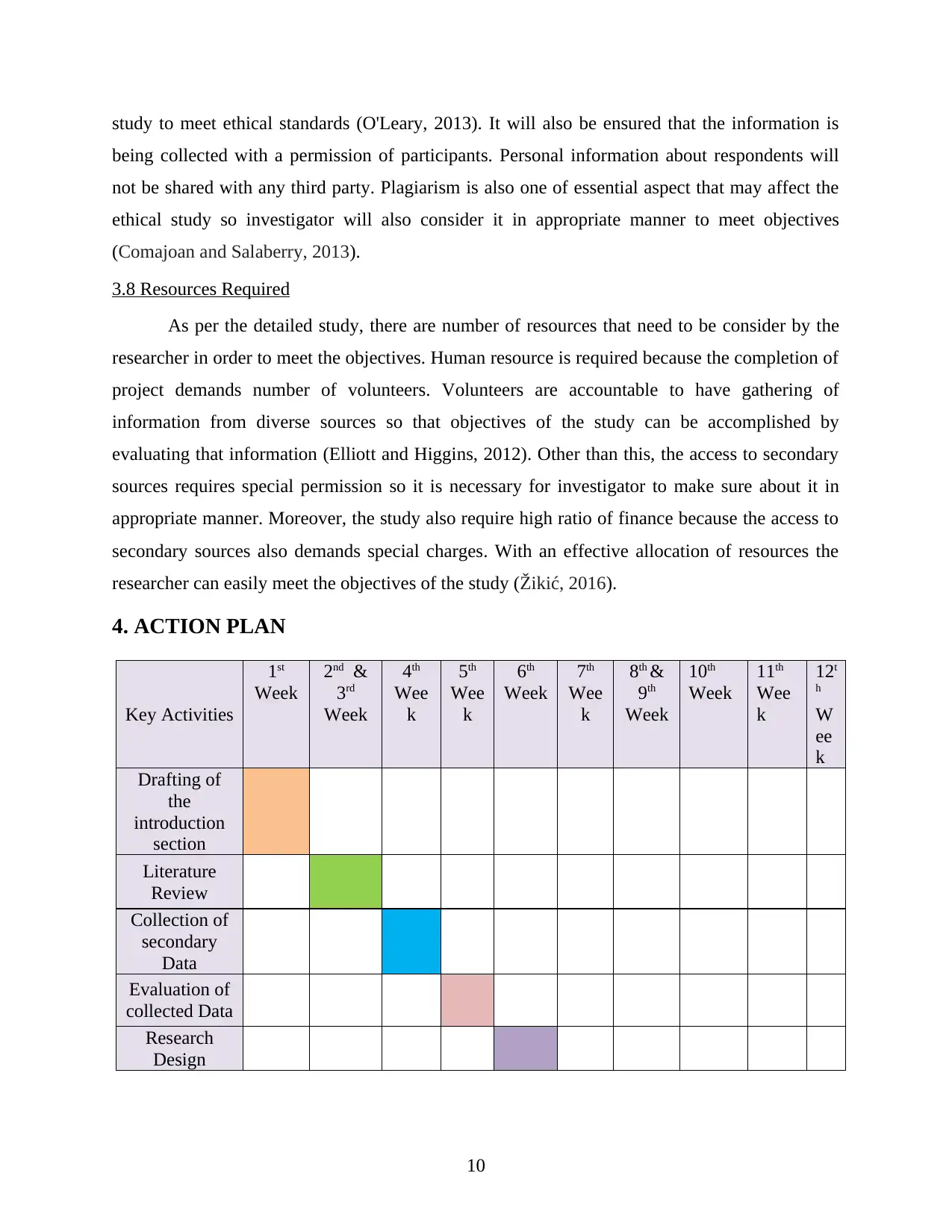
study to meet ethical standards (O'Leary, 2013). It will also be ensured that the information is
being collected with a permission of participants. Personal information about respondents will
not be shared with any third party. Plagiarism is also one of essential aspect that may affect the
ethical study so investigator will also consider it in appropriate manner to meet objectives
(Comajoan and Salaberry, 2013).
3.8 Resources Required
As per the detailed study, there are number of resources that need to be consider by the
researcher in order to meet the objectives. Human resource is required because the completion of
project demands number of volunteers. Volunteers are accountable to have gathering of
information from diverse sources so that objectives of the study can be accomplished by
evaluating that information (Elliott and Higgins, 2012). Other than this, the access to secondary
sources requires special permission so it is necessary for investigator to make sure about it in
appropriate manner. Moreover, the study also require high ratio of finance because the access to
secondary sources also demands special charges. With an effective allocation of resources the
researcher can easily meet the objectives of the study (Žikić, 2016).
4. ACTION PLAN
Key Activities
1st
Week
2nd &
3rd
Week
4th
Wee
k
5th
Wee
k
6th
Week
7th
Wee
k
8th &
9th
Week
10th
Week
11th
Wee
k
12t
h
W
ee
k
Drafting of
the
introduction
section
Literature
Review
Collection of
secondary
Data
Evaluation of
collected Data
Research
Design
10
being collected with a permission of participants. Personal information about respondents will
not be shared with any third party. Plagiarism is also one of essential aspect that may affect the
ethical study so investigator will also consider it in appropriate manner to meet objectives
(Comajoan and Salaberry, 2013).
3.8 Resources Required
As per the detailed study, there are number of resources that need to be consider by the
researcher in order to meet the objectives. Human resource is required because the completion of
project demands number of volunteers. Volunteers are accountable to have gathering of
information from diverse sources so that objectives of the study can be accomplished by
evaluating that information (Elliott and Higgins, 2012). Other than this, the access to secondary
sources requires special permission so it is necessary for investigator to make sure about it in
appropriate manner. Moreover, the study also require high ratio of finance because the access to
secondary sources also demands special charges. With an effective allocation of resources the
researcher can easily meet the objectives of the study (Žikić, 2016).
4. ACTION PLAN
Key Activities
1st
Week
2nd &
3rd
Week
4th
Wee
k
5th
Wee
k
6th
Week
7th
Wee
k
8th &
9th
Week
10th
Week
11th
Wee
k
12t
h
W
ee
k
Drafting of
the
introduction
section
Literature
Review
Collection of
secondary
Data
Evaluation of
collected Data
Research
Design
10
Secure Best Marks with AI Grader
Need help grading? Try our AI Grader for instant feedback on your assignments.
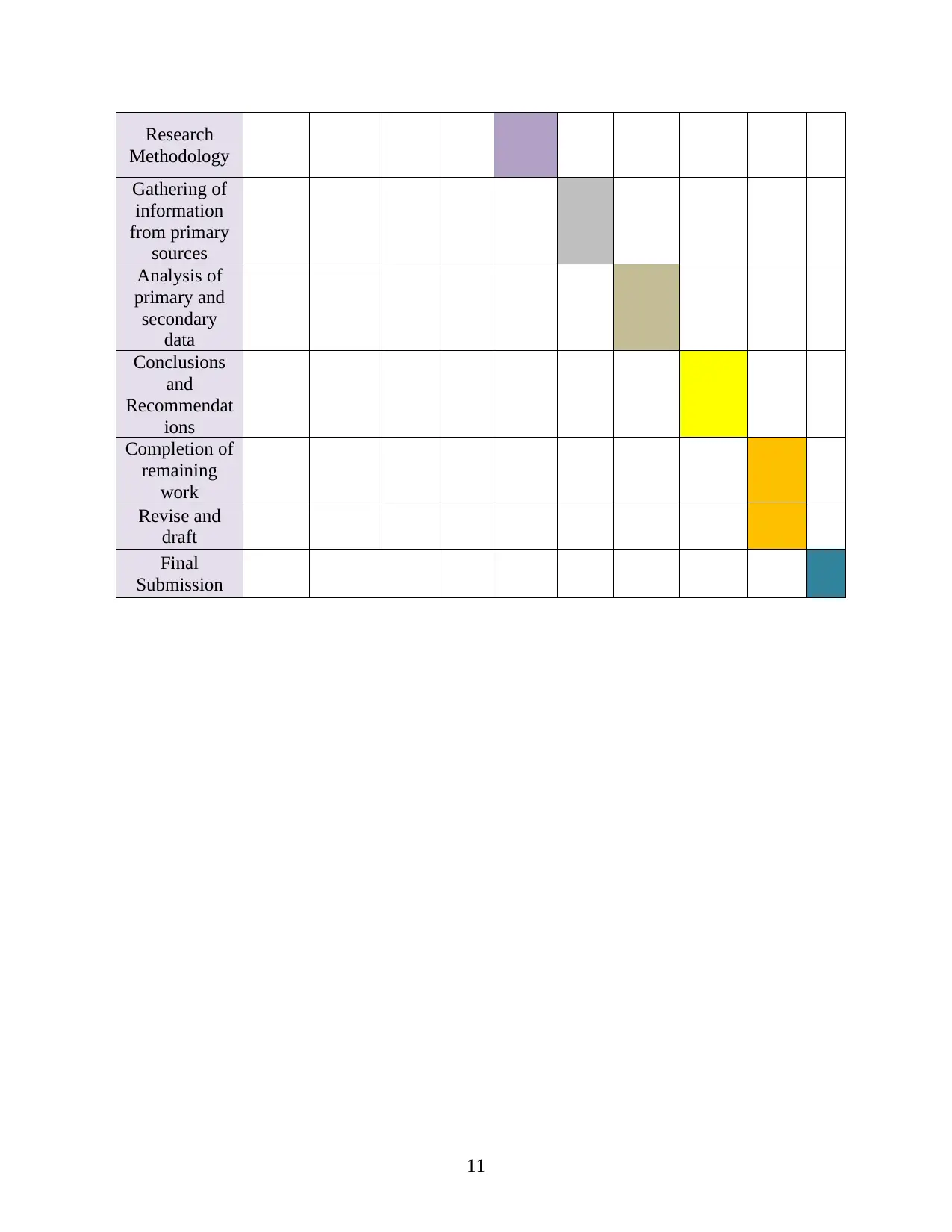
Research
Methodology
Gathering of
information
from primary
sources
Analysis of
primary and
secondary
data
Conclusions
and
Recommendat
ions
Completion of
remaining
work
Revise and
draft
Final
Submission
11
Methodology
Gathering of
information
from primary
sources
Analysis of
primary and
secondary
data
Conclusions
and
Recommendat
ions
Completion of
remaining
work
Revise and
draft
Final
Submission
11
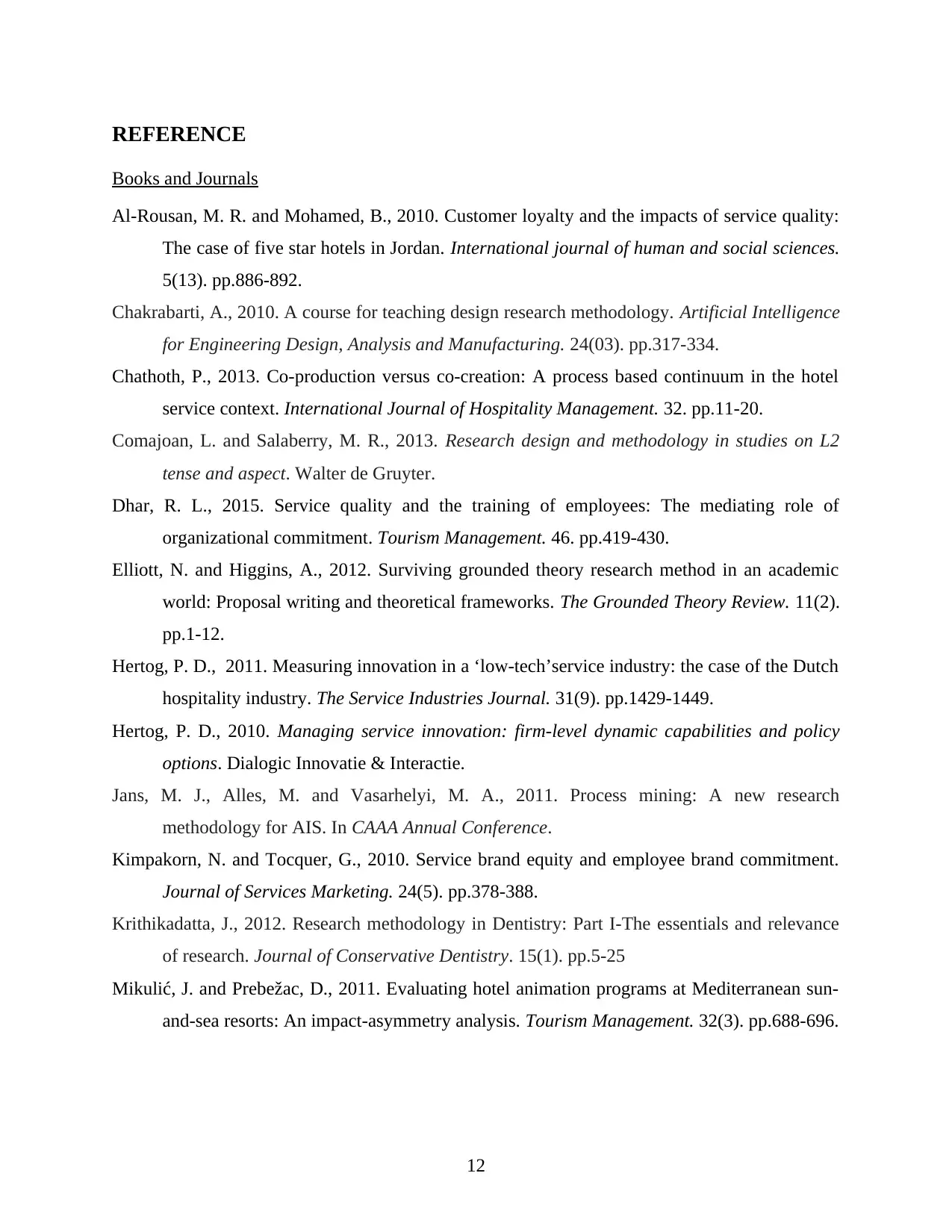
REFERENCE
Books and Journals
Al-Rousan, M. R. and Mohamed, B., 2010. Customer loyalty and the impacts of service quality:
The case of five star hotels in Jordan. International journal of human and social sciences.
5(13). pp.886-892.
Chakrabarti, A., 2010. A course for teaching design research methodology. Artificial Intelligence
for Engineering Design, Analysis and Manufacturing. 24(03). pp.317-334.
Chathoth, P., 2013. Co-production versus co-creation: A process based continuum in the hotel
service context. International Journal of Hospitality Management. 32. pp.11-20.
Comajoan, L. and Salaberry, M. R., 2013. Research design and methodology in studies on L2
tense and aspect. Walter de Gruyter.
Dhar, R. L., 2015. Service quality and the training of employees: The mediating role of
organizational commitment. Tourism Management. 46. pp.419-430.
Elliott, N. and Higgins, A., 2012. Surviving grounded theory research method in an academic
world: Proposal writing and theoretical frameworks. The Grounded Theory Review. 11(2).
pp.1-12.
Hertog, P. D., 2011. Measuring innovation in a ‘low-tech’service industry: the case of the Dutch
hospitality industry. The Service Industries Journal. 31(9). pp.1429-1449.
Hertog, P. D., 2010. Managing service innovation: firm-level dynamic capabilities and policy
options. Dialogic Innovatie & Interactie.
Jans, M. J., Alles, M. and Vasarhelyi, M. A., 2011. Process mining: A new research
methodology for AIS. In CAAA Annual Conference.
Kimpakorn, N. and Tocquer, G., 2010. Service brand equity and employee brand commitment.
Journal of Services Marketing. 24(5). pp.378-388.
Krithikadatta, J., 2012. Research methodology in Dentistry: Part I-The essentials and relevance
of research. Journal of Conservative Dentistry. 15(1). pp.5-25
Mikulić, J. and Prebežac, D., 2011. Evaluating hotel animation programs at Mediterranean sun-
and-sea resorts: An impact-asymmetry analysis. Tourism Management. 32(3). pp.688-696.
12
Books and Journals
Al-Rousan, M. R. and Mohamed, B., 2010. Customer loyalty and the impacts of service quality:
The case of five star hotels in Jordan. International journal of human and social sciences.
5(13). pp.886-892.
Chakrabarti, A., 2010. A course for teaching design research methodology. Artificial Intelligence
for Engineering Design, Analysis and Manufacturing. 24(03). pp.317-334.
Chathoth, P., 2013. Co-production versus co-creation: A process based continuum in the hotel
service context. International Journal of Hospitality Management. 32. pp.11-20.
Comajoan, L. and Salaberry, M. R., 2013. Research design and methodology in studies on L2
tense and aspect. Walter de Gruyter.
Dhar, R. L., 2015. Service quality and the training of employees: The mediating role of
organizational commitment. Tourism Management. 46. pp.419-430.
Elliott, N. and Higgins, A., 2012. Surviving grounded theory research method in an academic
world: Proposal writing and theoretical frameworks. The Grounded Theory Review. 11(2).
pp.1-12.
Hertog, P. D., 2011. Measuring innovation in a ‘low-tech’service industry: the case of the Dutch
hospitality industry. The Service Industries Journal. 31(9). pp.1429-1449.
Hertog, P. D., 2010. Managing service innovation: firm-level dynamic capabilities and policy
options. Dialogic Innovatie & Interactie.
Jans, M. J., Alles, M. and Vasarhelyi, M. A., 2011. Process mining: A new research
methodology for AIS. In CAAA Annual Conference.
Kimpakorn, N. and Tocquer, G., 2010. Service brand equity and employee brand commitment.
Journal of Services Marketing. 24(5). pp.378-388.
Krithikadatta, J., 2012. Research methodology in Dentistry: Part I-The essentials and relevance
of research. Journal of Conservative Dentistry. 15(1). pp.5-25
Mikulić, J. and Prebežac, D., 2011. Evaluating hotel animation programs at Mediterranean sun-
and-sea resorts: An impact-asymmetry analysis. Tourism Management. 32(3). pp.688-696.
12
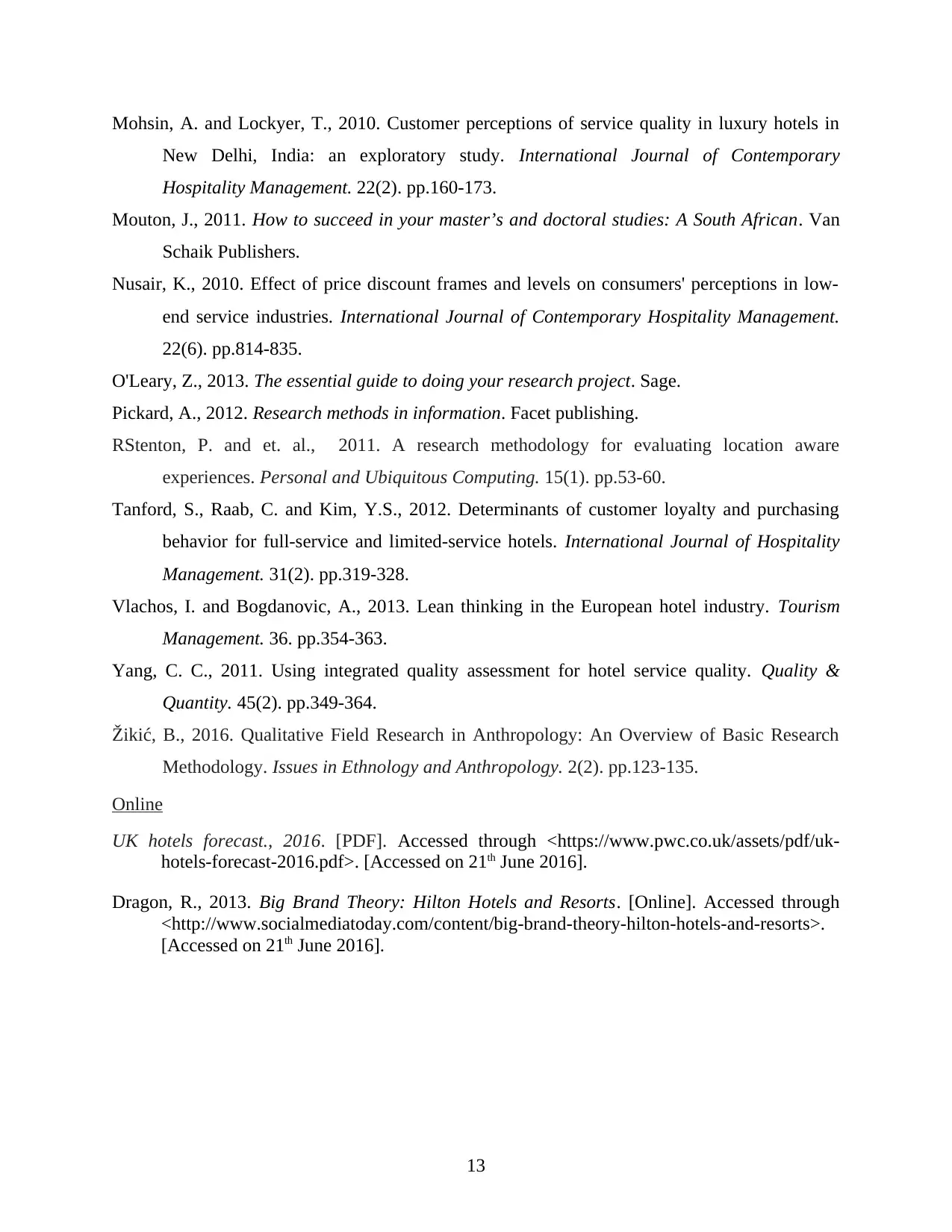
Mohsin, A. and Lockyer, T., 2010. Customer perceptions of service quality in luxury hotels in
New Delhi, India: an exploratory study. International Journal of Contemporary
Hospitality Management. 22(2). pp.160-173.
Mouton, J., 2011. How to succeed in your master’s and doctoral studies: A South African. Van
Schaik Publishers.
Nusair, K., 2010. Effect of price discount frames and levels on consumers' perceptions in low-
end service industries. International Journal of Contemporary Hospitality Management.
22(6). pp.814-835.
O'Leary, Z., 2013. The essential guide to doing your research project. Sage.
Pickard, A., 2012. Research methods in information. Facet publishing.
RStenton, P. and et. al., 2011. A research methodology for evaluating location aware
experiences. Personal and Ubiquitous Computing. 15(1). pp.53-60.
Tanford, S., Raab, C. and Kim, Y.S., 2012. Determinants of customer loyalty and purchasing
behavior for full-service and limited-service hotels. International Journal of Hospitality
Management. 31(2). pp.319-328.
Vlachos, I. and Bogdanovic, A., 2013. Lean thinking in the European hotel industry. Tourism
Management. 36. pp.354-363.
Yang, C. C., 2011. Using integrated quality assessment for hotel service quality. Quality &
Quantity. 45(2). pp.349-364.
Žikić, B., 2016. Qualitative Field Research in Anthropology: An Overview of Basic Research
Methodology. Issues in Ethnology and Anthropology. 2(2). pp.123-135.
Online
UK hotels forecast., 2016. [PDF]. Accessed through <https://www.pwc.co.uk/assets/pdf/uk-
hotels-forecast-2016.pdf>. [Accessed on 21th June 2016].
Dragon, R., 2013. Big Brand Theory: Hilton Hotels and Resorts. [Online]. Accessed through
<http://www.socialmediatoday.com/content/big-brand-theory-hilton-hotels-and-resorts>.
[Accessed on 21th June 2016].
13
New Delhi, India: an exploratory study. International Journal of Contemporary
Hospitality Management. 22(2). pp.160-173.
Mouton, J., 2011. How to succeed in your master’s and doctoral studies: A South African. Van
Schaik Publishers.
Nusair, K., 2010. Effect of price discount frames and levels on consumers' perceptions in low-
end service industries. International Journal of Contemporary Hospitality Management.
22(6). pp.814-835.
O'Leary, Z., 2013. The essential guide to doing your research project. Sage.
Pickard, A., 2012. Research methods in information. Facet publishing.
RStenton, P. and et. al., 2011. A research methodology for evaluating location aware
experiences. Personal and Ubiquitous Computing. 15(1). pp.53-60.
Tanford, S., Raab, C. and Kim, Y.S., 2012. Determinants of customer loyalty and purchasing
behavior for full-service and limited-service hotels. International Journal of Hospitality
Management. 31(2). pp.319-328.
Vlachos, I. and Bogdanovic, A., 2013. Lean thinking in the European hotel industry. Tourism
Management. 36. pp.354-363.
Yang, C. C., 2011. Using integrated quality assessment for hotel service quality. Quality &
Quantity. 45(2). pp.349-364.
Žikić, B., 2016. Qualitative Field Research in Anthropology: An Overview of Basic Research
Methodology. Issues in Ethnology and Anthropology. 2(2). pp.123-135.
Online
UK hotels forecast., 2016. [PDF]. Accessed through <https://www.pwc.co.uk/assets/pdf/uk-
hotels-forecast-2016.pdf>. [Accessed on 21th June 2016].
Dragon, R., 2013. Big Brand Theory: Hilton Hotels and Resorts. [Online]. Accessed through
<http://www.socialmediatoday.com/content/big-brand-theory-hilton-hotels-and-resorts>.
[Accessed on 21th June 2016].
13
1 out of 13
Related Documents
Your All-in-One AI-Powered Toolkit for Academic Success.
+13062052269
info@desklib.com
Available 24*7 on WhatsApp / Email
![[object Object]](/_next/static/media/star-bottom.7253800d.svg)
Unlock your academic potential
© 2024 | Zucol Services PVT LTD | All rights reserved.





